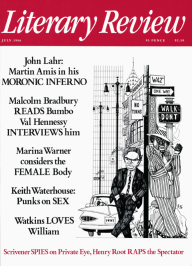John Lanchester
Humanists versus Theorists
Signifying Nothing: Truth's True Contents in Shakespeare's Text
By Malcolm Evans
Harvester Press 291pp £28.50
Shakespeare and the Question of Theory
By Patricia Parker & Geoffrey Hartman (edd.)
Methuen 335pp £20
In English culture, Shakespeare has become an impossibly bland and reassuring figure – a kind of continuation of the Queen Mother by other means. This makes it easy to forget how strange Shakespeare is. 'Gild the faces of the grooms withal,' says Lady Macbeth to her husband, 'for it must seem their guilt' – you can get so used to puns like that that they lose their shocking oddness. Certainly that pun shocked Dr Johnson: 'Could Shakespeare possibly mean to play on the similitude of gild and guilt?' he asked, horrified. Johnson's Shakespeare criticism remains essential because of his ability to be affronted, annoyed, upset by Shakespeare; his well-known inability to re-read King Lear is just the most famous instance of a continually heightened sensitivity. This strangeness of Shakespeare needs always to be rediscovered, by readers and by the theatre. Those productions which present King Lear as a senile brewery magnate, or perform Twelfth Night in full samurai regalia – that's what they're trying to do.
The recent tiny avalanche of theoretical work on the Bard (comprising Political Shakespeare, Alternative Shakespeares, Terry Eagleton's book, and the two volumes here under review) is an attempt to take up this work of renovation and reclamation. Shakespeare and the Question of Theory is a collection of essays by feminists,

Sign Up to our newsletter
Receive free articles, highlights from the archive, news, details of prizes, and much more.@Lit_Review
Follow Literary Review on Twitter
Twitter Feed
Under its longest-serving editor, Graydon Carter, Vanity Fair was that rare thing – a New York society magazine that published serious journalism.
@PeterPeteryork looks at what Carter got right.
Peter York - Deluxe Editions
Peter York: Deluxe Editions - When the Going Was Good: An Editor’s Adventures During the Last Golden Age of Magazines by Graydon Carter
literaryreview.co.uk
Henry James returned to America in 1904 with three objectives: to see his brother William, to deliver a series of lectures on Balzac, and to gather material for a pair of books about modern America.
Peter Rose follows James out west.
Peter Rose - The Restless Analyst
Peter Rose: The Restless Analyst - Henry James Comes Home: Rediscovering America in the Gilded Age by Peter Brooks...
literaryreview.co.uk
Vladimir Putin served his apprenticeship in the KGB toward the end of the Cold War, a period during which Western societies were infiltrated by so-called 'illegals'.
Piers Brendon examines how the culture of Soviet spycraft shaped his thinking.
Piers Brendon - Tinker, Tailor, Sleeper, Troll
Piers Brendon: Tinker, Tailor, Sleeper, Troll - The Illegals: Russia’s Most Audacious Spies and the Plot to Infiltrate the West by Shaun Walker
literaryreview.co.uk